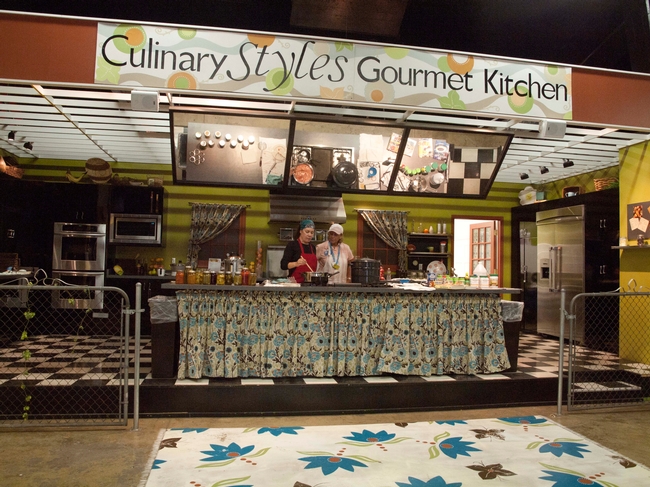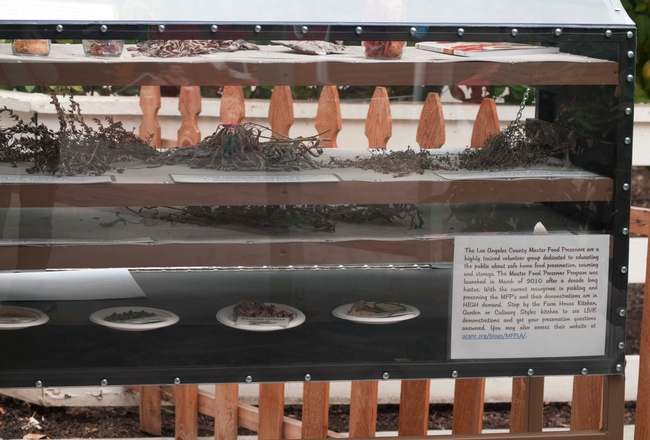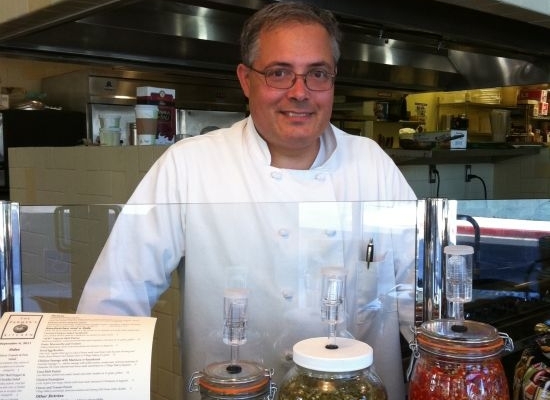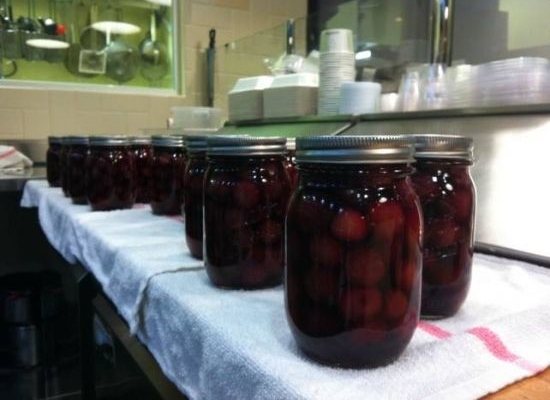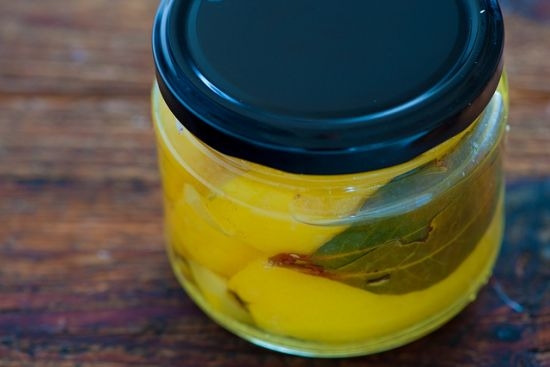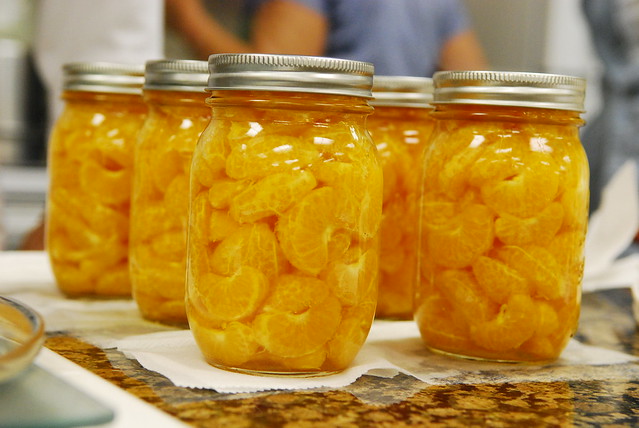Posts Tagged: Los Angeles County
We're Here at the Fair-- Where Are You?
If you haven't already planned your visit to the LA County Fair, now's the time. Master Food Preservers from Los Angeles County are on hand giving demonstrations and waiting to answer your questions about food preservation. On Wednesday, September 5th, Susan Nickels and Nancee Siebert got the ball rolling with a great introduction to the world of jam and jelly production (both with and without pectin).
Volunteers from MFPLA will present demonstrations at the Culinary Styles Stage (under the racetrack grandstand) on Wednesdays and and Fridays, 9/5 - 9/28 from 12 to 3 pm. Topics include jams and jellies, the art of pickling and fermenting, and how to preserve tomatoes.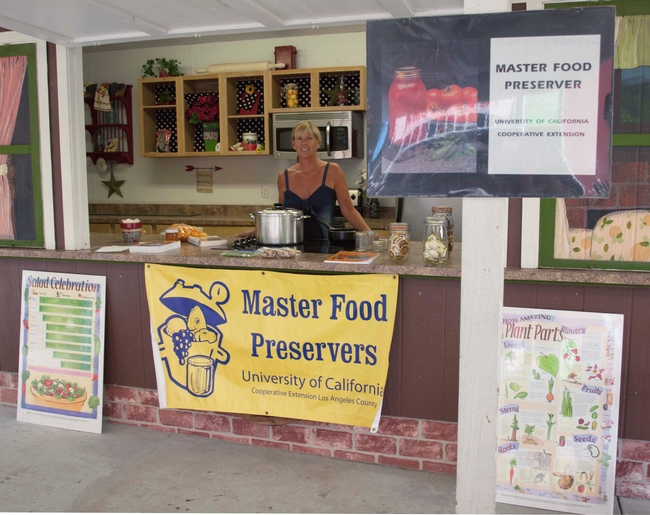
In the Farm House Kitchen across from the Big Red Barn, MFPs including Liisa Primack (seen above) will be discussing dehydration and other methods of food preservation. Come visit us from 9 am to 12 pm, Wednesdays through Fridays, 9/5- 9/28 and see Liisa's fantastic solar dehydrator.
OrganicAuthority.com Interview with MFPLA Lead Instructor Ernest Miller
REPRINTED WITH PERMISSION OF ORGANIC AUTHORITY (www.organicauthority.com)
Earth Day Profile: Chef Ernest Miller on a Different Kind of Soul Food
Written by Lacy Boggs Renner
(image: The Farmer's Kitchen)
In the heart of the bustling Hollywood Farmers Market sits The Farmer's Kitchen: a farm-to-table cafe as well as a commercial teaching, processing and retail kitchen offering affordable, healthy foods for patrons at all income levels. We chatted with chef Ernest Miller about the concept of The Farmer's Kitchen, the importance of eating "food in context" and the selfish reasons why Americans should be getting to know their farmers.
Organic Authority: What is the mission of the Farmer's Kitchen?
Ernest Miller: The Farmer's Kitchen is a non-profit community-oriented kitchen. We are a project of Sustainable Economic Enterprises of Los Angeles (SEE-LA), the non-profit that runs eight farmers markets in the Los Angeles area, including the largest, the Sunday Hollywood Farmers Market, which celebrates its 21st anniversary this year.
The Farmer's Kitchen supports the mission of SEE-LA in many ways: we serve a farm fresh, from scratch lunch to 280 elementary students at a local charter school (Larchmont Charter School West Hollywood) that is part of Alice Waters' Edible Schoolyard Project; we operate as a farm-to-table cafe, serving breakfast and lunch; we provide job and career training to culinary students, high school students and members of the general public who want to learn what it is like to work in a professional restaurant; we provide classes to low resource families (diet, nutrition, cooking, exercise) and classes for the general public; we also make many preserved foods and value-added products with farmers market produce.
(image: The Farmer's Kitchen)
OA: How are you actively involved in the local community?
EM: We are major supporters of the Master Food Preservers of the University of California Cooperative Extension, Los Angeles County, hosting some of their classes in the kitchen. We've also supported the Orange County Master Food Preserver program. We provide technical assistance to the Hollywood Orchard Project, helping them preserve the fruit from their neighborhood.
OA: What drives your menu creation?
EM: The fresh, seasonal produce of the Hollywood Farmers Market, as well as the many different preserved foods we also create.
OA: How do you work with local farmers?
EM: We work very closely with our local farmers, speaking to them on a weekly basis to learn what will be coming in soon, or leaving soon. We make suggestions on what they might want to grow and encourage and consult with them on making value-added products.
OA: Why is it important to you to support local sustainable farmers?
EM: If it isn't sustainable then, by definition, it cannot continue indefinitely. Our industrialized food system has been a boon in many ways, but is not ultimately sustainable. We believe that sustainability is going to have to start with local farmers and teaching people how to eat with the seasons. Local food also tastes better, when it is grown and harvested for flavor, not for shipping well. We believe in "food in context" — that when food is seasonal and expresses the history and culture of a place, it tastes best.
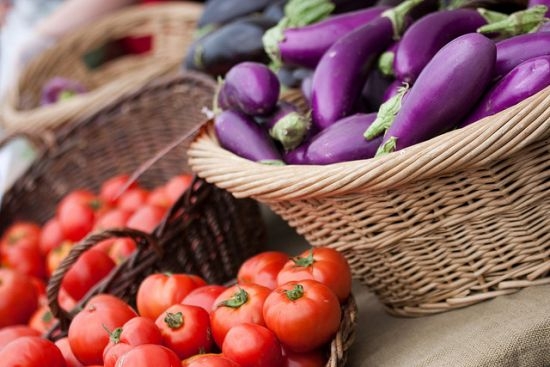
OA: What does sustainability mean to you?
EM: Sustainability means a practice of agriculture, cooking and eating that can go on indefinitely without destroying the health of our environment or ourselves. It is not just the farmers that need to be sustainable, but those who cook and eat the food as well.
OA: Why is it important for Americans to get to know where their food comes from, how it was raised and their farmers?
EM: Self-interest. Food tastes better when it is harvested locally and in season. It is generally less expensive, and is certainly less expensive when you take into account fair labor practices, environmental harms and all the other hidden costs of our industrialized food system.
Ultimately, we need to pay more attention to how and what we eat. We need to eat in context, knowing the place, history and culture of what we eat. When we eat, we feed not only our body, but mind and soul as well. If you don't know where your food comes from, how it was raised and who raised it, you may be feeding your body, but you are starving your mind and soul.
OA: How can America help revive the regional local farmer infrastructure that disappeared over 50 years ago?
EM: Support your local farmers, visit their farms, encourage and support programs that introduce children to what farming is all about (farm-to-school, 4-H).
OA: What cooking tips do you have to inspire home chef to cook more seasonally?
EM: Don't use recipes. Learn techniques, shop the farmers markets for fresh, delicious produce, and cook it simply.
OA: What is your must have, go-to home cooking tool?
EM: A 10-inch Chef's knife.
OA: What are your favorite must-have home pantry staples?
EM: A good extra virgin olive oil, a good pomace olive oil, home pressure-canned beans, brown rice and just to give a special, unique twist to all sorts of dishes, preserved lemons.
(image: jules:stonesoup)
OA: What shopping tips do you have for the home chef?
EM: Shop at a farmers market and see, feel, smell and taste the produce. Talk to the farmers, and don't be afraid to try something you've never had before.
Organic Authority would like to thank Ernest Miller and all of the sustainable, organic farmers and chefs whose work is providing healthy food for us all to eat. We honor you as being conscious stewards of our planet. And, we are thrilled to have you participating in our Earth Day event!
Welcome to the LA County Master Food Preservers Blog!
With just two weeks until the first 2011 Master Food Preserver class for LA County graduates, it seemed time to get our blog up and running at ucanr.org (don't you just love that url? ucanr? mecanr? theycanr?)
These past several weeks have been challenging, fun, educational, and fulfilling. But graduation is only the beginning. With new name badges and a slew of reference materials in tow, our MFP class will be going out into LA County and educating the public about safe home food preservation techniques, answering questions, and providing information about local resources.
And we're gearing up to offer the next Master Food Preserver class! We'll be announcing more detailed info about that very soon.
In the meantime, if you're in Los Angeles County and have questions about home food preservation, keep tabs on us here or visit our Facebook page. If you're interested in having a Master Food Preserver come to your farmers market or community event, please contact UCCE Nutrition, Family & Consumer Sciences Advisor Brenda Roche at bkroche@ucdavis.edu.
More to come! Stay tuned!
